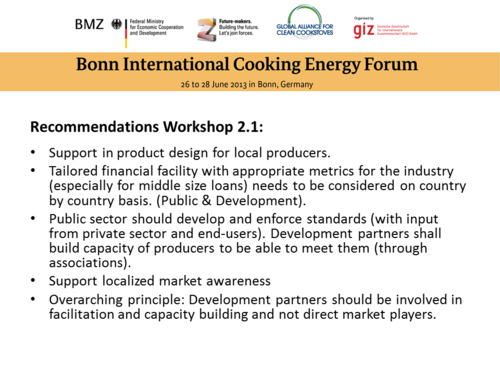Going to Scale - How Private and Public Sector can Join Forces to Create Vibrant Markets for Cookstoves Focusing on Local/National Production - Workshop 2.1 Recommendations Bonn 2013
| ► Back to Forum Overview | ► Back to Thursday, 27 June 2013 |
Workshop 2.1: Going to Scale – How Private and Public Sector can Join Forces to Create Vibrant Markets for Cookstoves Focusing on Local/National Production
Participants were given an introduction to the topic of vibrant markets and the public and private players involved. After this joint start, the workshop split into two subgroups, one focusing on national/local production and the other on global/multinational production. participants analyzed and discussed the different roles, potential and limitations of public and private sector players along the supply chain for stoves. Policy instruments, regulatory framework conditions and financing instruments were also discussed.
| ► | Facilitator/Chair: Julien Jacquot, GERES |
| ► | Rapporteur: Laura Clough, GVEP International |
Objectives
- Identifying expectations between public and private sector players
- Identifying opportunities for cooperation between the private and public sector
- Developing recommendations on improving the roles of private and public sector players
Presentations
Key Areas Discussed
1. Main achievements and challenges of partner organizations
2. Recommendations for partners along the cookstove value chain focusing on public sector, private sector, development organizations and financing institutions.
3.Prioritising these recommendations for local/national players.
Recommendations
1. Research:
- Involvement of professional researchers, Public Sector
- Making existing research available, Public Sector
- Constant research and knowledge sharing along the value chain. Governments need to get institutions involved, especially around performance and acceptance of the stoves, Public Sector
2. Product Design:
- Support to design/ meet standards, Public Sector
- Support to stove testing centers, Development Organizations
3. Product Development:
- Involvement in development of standards/ policy, Public Sector
- Locally initiated produce development, Public Sector
- Appropriate financing for stove SME’s, Financing Sector
4. Supplier & Consumer Financing:
- Tax reduction for certified products, Public Sector
- Support to businesses to access carbon financing, Public Sector
- Providing financing through MFI to purchase stoves, Financing Sector
5. Distribution:
- Developing links with existing distribution networks, Private Sector
- Development of associations to support regional distribution & sales centers, Private Sector
- Lobby development groups to fund user feedback, Public Sector
- Funding for user feedback assessments, Development Organizations
6. Consumer Adoption:
- Raising public profile of clean/ efficient cooking at national level (through national curriculum etc), Public Sector
- Support for localized market awareness (through existing public awareness channels), Public Sector
- Need for communication and awareness raising regarding product quality, Public Sector
- Include user acceptance in standards, Public Sector
- Include cooking energy in health awareness programs, Development Organizations
- NGO can partner with CBO to get stoves to remote areas, Development Organizations
7. General:
- Development partners should be involved in facilitation and capacity building and not direct market players (Development Sector)
Development partners can build capacity of public institutions and provide links along the value chain (Development Organizations)
Specific Action Proposed (Including Responsibilities)
- Support in product design for local producers.
- Tailored guarantee facility with appropriate metrics for the local industry players (especially for middle size loans) needs to be considered on country by country basis with appropriate support to businesses to access funding. (Public & Development Organizations).
- Role of government to develop and enforce standards (with input from Private Sector). Development partners to build capacity of producers to be able to meet them (potentially through associations).
- Support localized market awareness (Public Sector)
- Development partners should be involved in facilitation and capacity building and not direct market players (Development Sector)




















